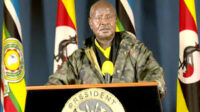Khartoum, Sudan – Since April 2023, Sudan has been engulfed in a brutal civil war following a power struggle between the country’s armed forces and the paramilitary Rapid Support Forces (RSF), triggering widespread famine, mass displacement, and what the United Nations has described as the world’s largest humanitarian crisis. More than 150,000 people have been killed, and approximately 12 million have been forced to flee their homes. Allegations of genocide have also emerged, particularly in the war-torn Darfur region.
Sudan, located in northeastern Africa, spans 1.9 million square kilometers, making it one of the largest countries on the continent. It borders seven nations and the Red Sea, and the River Nile runs through it, making the country geopolitically strategic. Despite its vast gold resources, Sudan was already among the world’s poorest nations before the conflict began, with the average income standing at just $750 per person in 2022. The war has drastically worsened its economic conditions, with state revenues reportedly shrinking by 80%, according to Sudan’s finance ministry.
The roots of the conflict trace back to the 2019 popular uprising that led to the removal of longtime dictator Omar al-Bashir, who had ruled Sudan since a 1989 coup. After his ousting, hopes for democratic governance were high, and a transitional joint civilian-military council was formed. However, in October 2021, this arrangement collapsed in another military coup led by General Abdel Fattah al-Burhan, the head of the Sudanese Armed Forces, and his then-deputy General Mohamed Hamdan Dagalo widely known as “Hemedti” the powerful commander of the RSF.
Tensions between the two generals intensified over plans to integrate the RSF into the national army, a critical step toward restoring civilian rule. The dispute revolved around who would command the new unified force, with both sides accused of clinging to power, wealth, and influence at the expense of the nation’s stability. On April 15, 2023, these tensions erupted into open warfare after the RSF began repositioning its forces across the country, a move seen by the army as a provocation. It remains unclear who fired the first shot, but fighting rapidly escalated.
The RSF initially gained control over large parts of the capital, Khartoum, and other key areas, prompting mass displacement and international concern. The Sudanese army reclaimed significant territory nearly two years later, in March 2025. However, the conflict has devastated infrastructure, crippled governance, and left millions in desperate need of food, medical aid, and security.
Sudan’s civil war continues to draw condemnation and urgent calls for international intervention, but peace remains elusive. Without a clear resolution or an inclusive political process, the suffering of Sudanese civilians only deepens, threatening the long-term stability of the entire Horn of Africa region.














Leave a comment